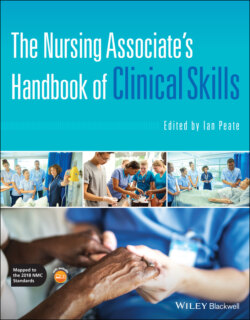Читать книгу The Nursing Associate's Handbook of Clinical Skills - Группа авторов - Страница 43
Orange Flag Communicating with Older People with Cognitive Impairment
ОглавлениеConfusion or disorientation in older people can be caused by a variety of factors such as infection, delirium or dementia. Older people with cognitive impairment are more at risk of developing delirium. Delirium is characterised as restlessness, agitation or aggression (hyperactive delirium), or being sleepy, quiet or withdrawn (hypoactive delirium). People generally present with a mixture of hyperactive and hypoactive delirium (National Institute for Health and Care Excellence 2014). Communication with people who are disorientated or confused can be challenging. Haddad et al. (2019), suggest that a healthcare professional should not maintain the confusion, but they should re‐orientate the person, unless doing so would result in deep agitation or violence. Politely listening with interest will enable the healthcare professional to determine how deep the confusion is and from this can decide the best course of communication. Richardson (2017) talks about a humanistic approach to communication, that is, being empathetic and non‐judgemental. The nursing associate should remain professional when in challenging situations and allow a moment before responding to an angry or distressed person. It is important that the nursing associate responds in calm manner and ascertains what is causing that distress or anger. Moving on from this point, the nursing associate needs to demonstrate empathy. In order to demonstrate empathy, the nursing associate needs to utilise their skills in non‐verbal communication and should respond to the patient’s experiences, not their own (Richardson 2017).
